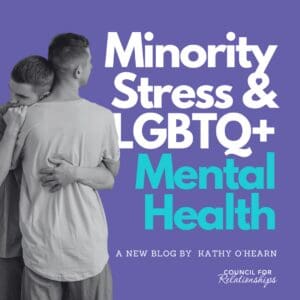Minority Stress & LGBTQ+ Mental Health: What to Know
At Council for Relationships, we believe representation, visibility, and affirmation are essential to LGBTQ+ mental health. In this blog, Clinical Intern Kathy O’Hearn—a master’s student at Thomas Jefferson University and a recipient of CFR’s Diversity Scholarship for Emerging Clinicians—shares her reflections on what it means to live authentically as a member of the LGBTQ+ community during a time of growing social and political uncertainty. With empathy and encouragement, Kathy explores how minority stress impacts the LGBTQ+ community and how connection, care, and validation can support LGBTQ+ mental health in this moment in history.

Get matched with a CFR Therapist today.
The Emotional Impact of the Current Climate on LGBTQ+ Mental Health
Many of us can point to specific times in history when society changed in ways that were either hopeful or unsettling. For LGBTQ+ individuals, the present moment may feel especially uncertain. News feeds are full of legislation and rhetoric that question the rights and existence of LGBTQ+ people. In times like these, it is normal to feel anxious, discouraged, or overwhelmed.
These feelings are not signs of weakness. They are understandable responses to what is happening in the world around us. Recognizing how external stressors affect our emotional well-being is the first step toward supporting LGBTQ+ mental health and building resilience.
Transgender and Nonbinary Youth Are Facing a Mental Health Crisis
LGBTQ+ individuals experience elevated rates of emotional distress, but transgender and nonbinary youth face especially high risks. The Trevor Project’s 2023 U.S. National Survey on the Mental Health of LGBTQ Young People reports that 86% of transgender and nonbinary youth felt recent politics harmed their well-being, and nearly 1 in 3 attempted suicide in the past year.
These outcomes do not reflect anything wrong with being trans or nonbinary. They reflect a world that continues to reject, exclude, and harm people for living as their authentic selves. Trans youth often experience rejection from family, discrimination at school, and laws that deny their identities. These experiences deeply affect LGBTQ+ mental health.
Research shows that gender-affirming care, support from even one affirming adult, and access to inclusive environments reduce suicide risk and improve mental health. Unfortunately, lawmakers and institutions often target these critical supports first. When we protect and affirm transgender and nonbinary youth, we support the entire landscape of LGBTQ+ mental health.
Understanding Minority Stress in LGBTQ+ Communities
Research shows that LGBTQ+ individuals often experience what is called minority stress—the added burden of navigating a society where discrimination and prejudice persist. This stress doesn’t just come from obvious acts of hate. It can also come from subtle social cues, exclusion, or internalized negative beliefs.
Over time, the effects of minority stress can lead to increased anxiety, depression, and isolation. It’s important to name these challenges and remind yourself that your responses to them are valid. These are not personal failings—they are reactions to an environment that can often feel hostile. Addressing minority stress directly is a vital part of improving LGBTQ+ mental health.
Minority Stress Is Amplified for Trans People of Color
Minority stress impacts all LGBTQ+ people, but transgender people of color face compounded stress from racism, transphobia, and other forms of systemic oppression. These overlapping identities create unique challenges that mainstream conversations often ignore.
According to the National Center for Transgender Equality’s 2022 U.S. Trans Survey Preliminary Findings, Black transgender people face twice the unemployment rate of the general U.S. population and report significantly higher levels of psychological distress and suicide attempts (NCTE, 2023). The Trevor Project also found that nearly 2 in 5 Black LGBTQ+ youth seriously considered suicide in the past year, with even higher rates among those who identify as transgender or nonbinary.
These statistics highlight how systems of oppression fuel minority stress and harm LGBTQ+ mental health. Trans people of color do not just face isolated struggles—they navigate a society that consistently denies them safety, stability, and recognition. When we prioritize equity in mental health care, we must center the voices and needs of Black, Brown, and Indigenous LGBTQ+ people.
By acknowledging the specific impact of minority stress on trans people of color, we can build more inclusive and healing-centered mental health support. Every step toward equity strengthens the foundation of LGBTQ+ mental health.
Living Authentically Despite Minority Stress
Many LGBTQ+ people have experienced transformation by choosing to live more authentically. Coming out, finding affirming relationships, and rejecting harmful narratives can open doors to a life that feels fuller and more honest. Living in your truth, even when it is difficult, creates space for connection and joy.
Still, authenticity does not guarantee safety. Even when supportive laws are passed, cultural bias does not disappear. When society takes steps backward—as it sometimes does—it can reactivate minority stress and make it harder to maintain emotional well-being. These moments can be disheartening, but they also remind us why community, care, and support are essential for protecting LGBTQ+ mental health.
Community as a Protective Factor in LGBTQ+ Mental Health
Supportive communities are one of the most powerful resources for resilience. In the face of anti-LGBTQ+ messages and policies, turning to people who affirm your identity can help you feel grounded and seen.
Connection Helps Reduce Minority Stress
Studies show that community connectedness is linked to better outcomes in LGBTQ+ mental health. When you are part of a group where you don’t have to explain or defend your identity, it becomes easier to remember your worth. These connections act as a buffer against minority stress, reminding you that you are not alone.
Whether you find community in a local LGBTQ+ center, a social group, a faith-based space, or an online platform, the key is to seek out places where you feel safe, supported, and celebrated.
Giving Back Builds Purpose and Connection
Once you’ve found community, you may find healing in giving back. Volunteering, mentoring, or supporting LGBTQ+ organizations can help create a sense of agency during uncertain times. It reminds you that your presence matters—and that you are part of something larger than yourself.
If you’re not sure where to start, explore organizations like GLAAD and the Human Rights Campaign’s Philadelphia Chapter, which offer opportunities to connect, advocate, and learn.
Validating Emotions to Support LGBTQ+ Mental Health
In times of social and political upheaval, it’s common to feel a mix of emotions—fear, anger, grief, confusion. These emotions are real and worth honoring. Denying or minimizing them only makes them harder to carry.
Your Feelings Are Valid and Important
It’s okay to feel upset by what’s happening in the world. Anti-LGBTQ+ rhetoric and actions are harmful. Acknowledging that hurt is a powerful step toward healing and improving LGBTQ+ mental health. You do not need to justify your pain. Your identity is not up for debate.
This is also a time when many people feel the weight of internalized oppression—those messages we’ve absorbed that tell us we are “less than” because of who we are. These thoughts contribute to minority stress, but recognizing and naming them can reduce their power.
Coping Tools for LGBTQ+ Mental Health and Well-being
While it is important to stay informed, constant exposure to harmful news can increase distress. Finding a balance between awareness and self-protection is key to supporting LGBTQ+ mental health.
Turn Toward What Brings You Joy
What helps you feel most like yourself? Maybe it’s spending time with friends, reading a book, exercising, or watching your favorite show. Whatever brings you a sense of joy and comfort, make time for it. Joy is not just a luxury—it’s a form of resistance that reduces minority stress.
Taking intentional breaks from social media or limiting how often you check the news can also help. Create rituals or routines that support calm and connection, especially on difficult days.
Self-Care as a Personalized Practice
There’s no one-size-fits-all approach to self-care. For some people, it might be journaling or meditation. For others, it could be setting boundaries, cooking a nourishing meal, or spending time in nature. These practices build resilience and help maintain LGBTQ+ mental health in a difficult world.
When to Seek Help for LGBTQ+ Mental Health Challenges
Some feelings become too heavy to manage alone. If that’s the case for you, reaching out for professional support can make a difference. Therapy offers a space where your emotions are welcomed and your identity is affirmed.
At Council for Relationships, we offer income-based therapy, as well as specialized support groups, including one for transgender clients. No matter where you are in your journey, you deserve care that sees you, honors you, and helps you manage the impact of minority stress on your well-being.
Editor’s Note: The views expressed in this blog are those of the author and do not necessarily reflect the official policy or position of Council for Relationships.
Uplifting Voices and Expanding Access to Care
At CFR, we believe that compassionate mental health care starts with the people who provide it—and the programs that train and support them. From our clinical interns to our scholarship recipients, every member of our team helps shape a more inclusive and accessible future for therapy.
About Kathy O’Hearn
Kathy O’Hearn (she/her) is a Clinical Intern at Council for Relationships and a graduate student at Thomas Jefferson University. Her clinical focus includes working with LGBTQ+ clients, and she values creating spaces where people feel safe to express their full selves. Kathy is one of two recipients of CFR’s Diversity Scholarship for Emerging Clinicians.
About CFR’s Clinical Internship Program
Council for Relationships’ Clinical Internship Program is a nationally respected training opportunity for graduate students studying individual, couples, and family therapy. Interns receive weekly supervision from licensed clinicians and gain experience working with diverse client populations. The program helps expand access to high-quality therapy while preparing the next generation of mental health professionals.
To learn more, visit our Clinical Internships page.
More from CFR
At Council for Relationships, we believe everyone deserves expert, compassionate mental health care. We have over 60 therapists and psychiatrists ready to support you with individual, couples, and family therapy—both in person and online.
- Find your match: Get connected with a therapist who understands your needs
- Stay informed: Subscribe to our newsletter for new blog posts, mental health resources, and workshop updates
- Keep exploring: Visit our blog to read more from CFR therapists and interns
Transgender Day of Visibility: How Support Creates Safer, Stronger Communities

